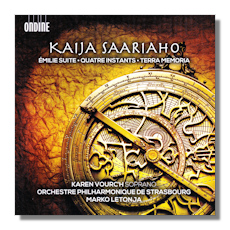
The Internet's Premier Classical Music Source
Related Links
- Saariaho Reviews
- Latest Reviews
- More Reviews
-
By Composer
-
Collections
DVD & Blu-ray
Books
Concert Reviews
Articles/Interviews
Software
Audio
Search Amazon
Recommended Links
Site News
 CD Review
CD Review
Kaija Saariaho

- Quatre Instants *
- ÉMilie Suite *
- Terra Memoria
* Karen Vourc'h, soprano
Strasbourg Philharmonic Orchestra/Marko Letonja
Ondine ODE1255-2
Finnish composer Kaija Saariaho (born 1952) has the great gift of being able to write highly memorable and substantial music of true atmosphere and real presence without having to resort to the wishy-washy insipid and cliché-ridden techniques of the "New agers". Her music has both color and penetration. This excellent new CD from Ondine would make a good introduction to the composer if she is new to you. The music here displays those gifts in different ways, and the performers do Saariaho proud.
There are three major orchestral works which have no connection in their subject matter. Yet each reflects Saariaho's response to external artistic, natural and scientific milieus. Anything but perfunctory or potentially arbitrary, the sources, inspirations and starting stimuli which these represent, provide a wholly convincing logic that explains why and how Saariaho composes as she does. Her operas are about their characters as much as they are about music. Such impetuses informs these three works. Such priorities reflecting the external components are respected and driven firmly home by the Strasbourg Philharmonic Orchestra under Marko Letonja, with soprano Karen Vourc'h in the Quatre Instants and the ÉMilie Suite.
Quatre Instants was originally written (in 2002) for piano and soprano (Karita Mattila) only, but almost immediately expanded for orchestra. The latter incarnation still has concentration, focus, movement and intensity. The texts by Saariaho's established collaborator, Lebanese Amin Maalouf, all concern love in various ways. The relationship between voice and an orchestra of what intentionally sounds like chamber proportions embodies the very notion of togetherness, union. Yet the precision and rigor of the players ensures that there is less of the purely romantic than of the eternal in these loves. The delivery of Vourc'h is not so tight or sure as would be that of Mattila; There are times when notes aren't held as they should be. But hers is a creditable performance nevertheless.
"Intensity" is a quality equally applicable to the halting yet unified Terra Memoria; this work also exists in more than one version. Particularly effective is the arch which Letonja creates… from and to (implied) silence. Terra Memoria (the shortest here) is also punchy, pungent and full of fire. Where there is mystery or doubt, it seems to be for a reason. The orchestra is to be applauded for the balance its members strike between emphasizing color and texture and a kind of reticent restraint which ends up communicating far more than an all-out assault.
The ÉMilie Suite draws on material from Saariaho's opera of that name; it too had Maalouf as librettist. Taking place on a single night in 1749, it examines the thoughts of the mathematician-physicist mistress of Voltaire. Saariaho's achievement in compacting a nine-scene opera lasting almost an hour and a half into a piece for restricted orchestra (chiefly single winds, and a harpsichord) lasting a quarter of that is remarkable. Indeed, it does make one want to go on and explore the full opera, of which no recording is (yet) available. Again the focus, the fire, the potency, are striking. Nor could they have been merely hinted at by a self-aggrandizing conductor or orchestra. These forces with Vourc'h achieve real impact and sense of purpose and direction. The insight into ÉMilie du Châtelet's complex character isn't perhaps always as fully drawn here by the soprano here as it was by Mattila (at the Opéra national de Lyon under Kazushi Ono in 2010) in the full opera – itself also an amazing monodrama – but compelling nevertheless.
Saariaho's is the kind of contemporary composition that seems to have so much in its favor. Accessible to those for whom more adventurous styles may not be, her music is nevertheless original. It's pioneering in its integrity and rigor. And it's music full of expression thanks to the composer's wide and uncompromising references from the world known by (or potentially familiar to) her audiences.
The acoustics – of the Neugartheim-Ittlenheim Hall (in eastern France) for the ÉMilie Suite and Quatre Instants and the Cité de la musique, Strasbourg (in France) for the purely instrumental work – help the performances. Resonant and spacious, they suggest and support not only the wide palette which Saariaho employs, but also the sense that her scales of references are broad. Hence significant. The booklet in English, French and Finnish contains useful background to works and performers. These are all first recordings, and ones you should not hesitate to buy either if you are already enchanted by Saariaho's persuasive sound world, and/or want examples of some of the most confident and successful new music being written today. Strongly recommended.
Copyright © 2015, Mark Sealey





















